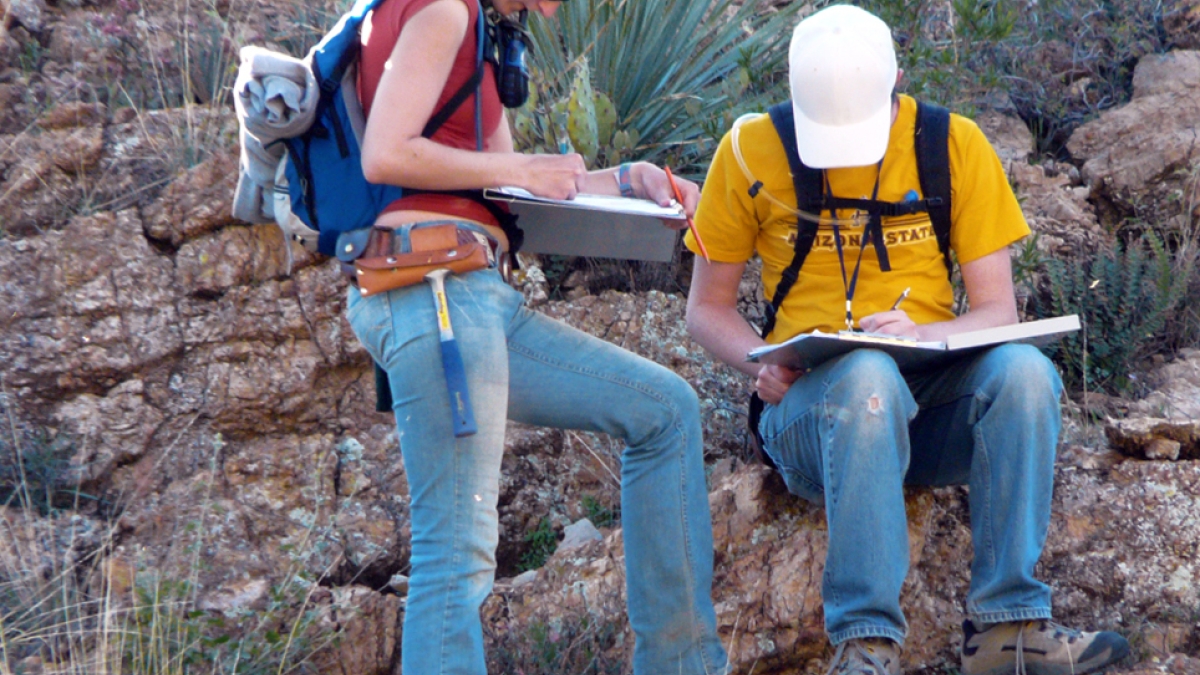US News ranks School of Earth and Space Exploration No. 12 for earth science grad program

ASU School of Earth and Space Exploration geological sciences graduate students conducting fieldwork. Photo by Sharp/ASU
Arizona State University's School of Earth and Space Exploration has been ranked No. 12 by U.S. News & World Report for its 2023 rankings of America’s graduate schools for earth sciences.
The school shares the No. 12 spot with Brown, Harvard, Princeton, University of California Los Angeles, University of California San Diego and the University of Wisconsin, Madison. The school ranked ahead of Yale, Cornell, Rice, Virginia Tech and Ohio State University, among others.
“It is wonderful to see our graduate programs in the earth sciences ranked among the top programs in the country,” said Meenakshi Wadhwa, director of the School of Earth and Space Exploration. “This reflects our strong commitment to the quality of our graduate education, which is predicated not only on the high caliber of our faculty and students, but also on cultivating an interdisciplinary, collaborative and inclusive culture.”
For the earth sciences specialties, the school ranked No. 3 for geochemistry and No. 5 for both geology and environmental sciences. In geochemistry, the school shares the No. 3 spot with Pennsylvania State University, and ranked ahead of University of California Berkeley, Massachusetts Institute of Technology, Stanford and University of Arizona, among others. In geology, the school shares the No. 5 spot with University of California Santa Barbara, and ranked ahead of University of California Berkeley, Massachusetts Institute of Technology and Stanford, among others. Additionally, the school was ranked No. 17 in the geophysics specialty.
“It is very exciting to see the strength of our earth sciences graduate programs being recognized in the rankings,” said Hilairy Hartnett, professor and associate director for graduate initiatives in the School of Earth and Space Exploration. “We know the rankings play a role in how students research different programs and compare institutions when they are applying to graduate schools.”
The School of Earth and Space Exploration was formed in 2006 to facilitate exploration and discovery while bridging the cultural gap between engineers and scientists. One of the school’s nuclei was the Geology/Geological Sciences Department at ASU, which began its rise to prominence starting in the 1960s. The school is now over 15 years old and has matured into a dominant research-intensive school, committed to high-impact scientific discovery and science education.
The school is built on a foundation of cross-disciplinary collaboration and includes faculty as diverse as astrophysicists, volcanologists, biogeochemists and electrical engineers. There are more than 74 faculty, over 30 teaching and research professionals, over 20 research scientists and postdoctoral scholars, over 140 graduate students and more than 400 undergraduate students.
Graduate programs in the earth sciences offered by the school include master’s degrees in geological sciences and earth and space sciences, and a geological sciences PhD. In these programs, students study the interiors and surfaces of the Earth and other bodies in the solar system while working with world-class faculty on USGS-, NASA- and NSF-funded projects in state-of-the-art laboratories and in the field on any of the seven continents.
Earth science faculty in the school include geologists, geochemists, volcanologists, Earth systems and climate scientists, biogeochemists, oceanographers, geophysicists, geomorphologists, hydrologists and ecologists; as well as planetary scientists, astrobiologists and cosmochemists, all of whom are leaders in their respective disciplines and fields.
U.S. News & World Report provides several higher education rankings throughout the year, and last fall rated ASU as the most innovative university in the country for the seventh year in a row. The data for the rankings came from statistical surveys of more than 2,150 programs, according to U.S. News & World Report.
More Science and technology

Science meets play: ASU researcher makes developmental science hands-on for families
On a Friday morning at the Edna Vihel Arts Center in Tempe, toddlers dip paint brushes into bright colors, decorating paper…

ASU water polo player defends the goal — and our data
Marie Rudasics is the last line of defense.Six players advance across the pool with a single objective in mind: making sure that…

Diagnosing data corruption
You are in your doctor’s office for your annual physical and you notice the change. This year, your doctor no longer has your…

